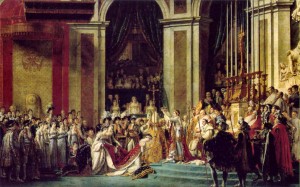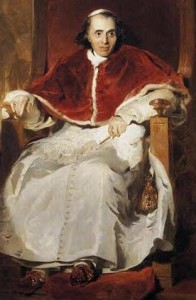Which comes first, democracy or enlightenment? Continue reading
I know very little about the details of the struggle to establish something resembling democracy in the Middle East. I also am uncertain as to whether the chicken came before the egg. I am pretty certain of one thing, however, and that is that enlightenment is a prerequisite for democracy.
The Enlightenment began in Europe in the sixteenth century or, arguably, as early as the end of the fourteenth century. It was a reaction against what I like to call The Big Deal, the agreement between the papacy and the nobility to control everything. This arrangement began in the late years of the eighth century when the papacy was under siege on all sides by the Lombards, the last of the Germanic troops to invade the Italian peninsula. In Pope Stephen II (or III if you count the guy who was pope for three days in 752) crossed the Alps to meet with Pepin, the nomadic ruler of the Franks. The details of this meeting are sketchy, at best. The pope probably used some forged documents known as the Donation of Constantine to convince Pepin that he, the pope, was the rightful ruler of all of western Europe. The two agreed to share power. In 800 Pepin’s son Charlemagne was crowned emperor by Pope Leo III, and, in return for papal recognition of the ascendancy of his family, he effected his own “donation” of a swath of central Italy to the papacy and swore to protect it from any and all invasions. For 1,000 years this agreement formed the basis for government in central and western Europe.
The details of this arrangement varied considerably over the next millennium, but the essential elements remained constant. The pope made binding moral judgments; the emperor and all the nobility enforced them. Emperor Frederick II — not the pope — made heresy, which is essentially anything that questions a papal decree, a capital crime throughout the empire. Untold thousands of heretics were executed. The popes called for crusades over a dozen times, and the kings and emperors were expected to spring into action. In return the popes made it clear that it was always sinful to question the authority of the princes. One hand washed the other.
This relationship held firm until the time of the Thirty Years War. Thereafter it was still dominant in Catholic countries until Napoleon crushed it by crowning himself emperor. He even forced Pope Pius VII to watch him do it. The contract was officially abrogated in 1870 when the fledgling Italian republic officially eliminated the pope’s status as a ruler of a portion of Italy and let him run things only in the world’s tiniest country, Vatican City.
I would be willing to bet that the Vatican never becomes a democracy, or, at the very least, it will be one of the last places on earth that allows popular rule. The Big Deal is still in effect there, but it is between the pope as spiritual ruler of Catholicism and the pope as civil ruler of his postage-stamp-sized kingdom.
Most of the rest of the world did not suffer through the pain of replacing the Big Deal with a different model. In the United States people who set up the government were English citizens who were intimately familiar with the perils of an established church. They specifically prohibited any such idea in the constitution. South America, on the other hand was settled by Europeans from countries that still supported the Big Deal. Their colonies have had a much more difficult time implementing and sustaining popular rule.
That brings us to the Middle East, the place in which the Enlightenment is just now in its infancy. Israel has a state religion. Nearly all of the Arab countries also have one. Some of them call themselves “Islamic republics,” but to my way of thinking, the nomenclature is as ludicrous as the “people’s republics” of the countries behind the Iron Curtain. It is difficult to think of a single example in which establishment of popular rule was not preceded by a bloody period of Enlightenment. It just makes sense that as long as the opinions of religious leaders are officially considered divinely inspired, the will of the people will take a back seat. Those who have been in power are unlikely to relinquish it willingly.
So, it seems inevitable that there will be continued clashes in the Middle East between religions, between the religious leaders and the privileged military and civilian authorities, and between the underprivileged and everyone else. The task ahead for a nation like ours that would simply like to speed up the process and minimize the bloodshed there will be difficult. Just think of Egypt, in which the secularists, the Islamists, and the military/bureaucracy complex are vying for power. Whom should we support? Anyone? Does our support cause as much long-term damage as short-term gain? In Egypt today the U.S. is vilified both for supporting the military and for supporting Morsi’s government.
To me the scary people are those who think that these questions have clear answers. It was much easier for Lafayette. He supported our revolt against England in large part because of his respect for enlightened people like George Washington, Ben Franklin, and John Adams. If there are any people of George Washington’s stature in the Middle East today I have not heard of them.





